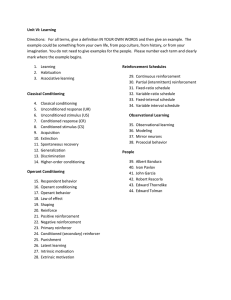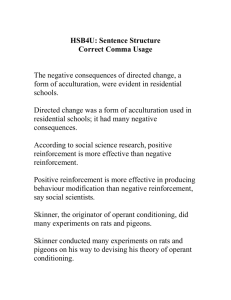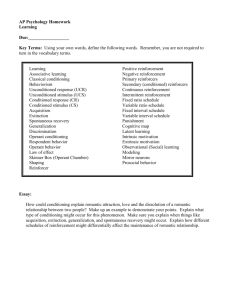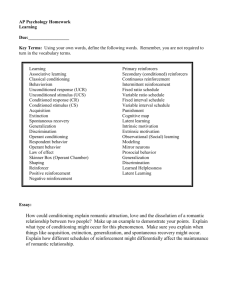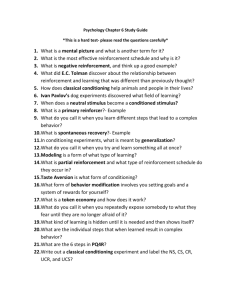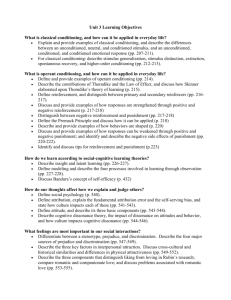Operant Conditioning (cont.)
advertisement
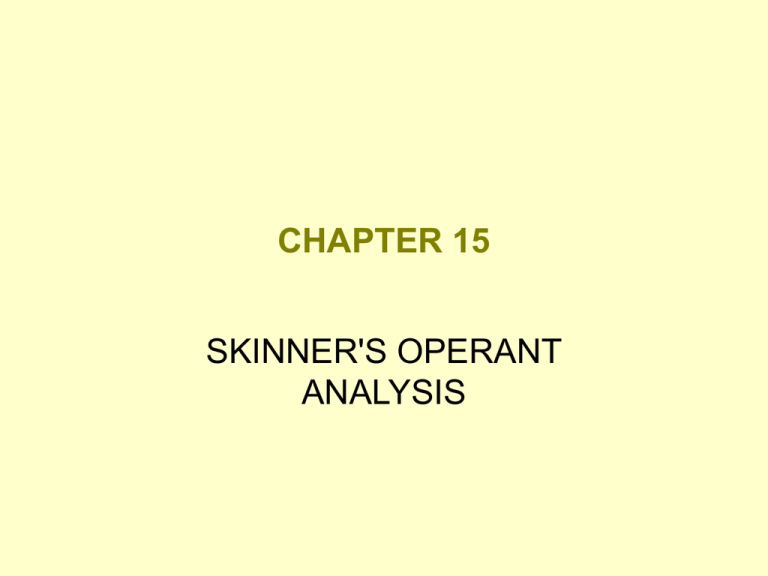
CHAPTER 15 SKINNER'S OPERANT ANALYSIS Personality from an Operant Analysis Approach • • Personality - study of unique learning history and unique genetic make-up (assuming that the person is not an identical twin) of the individual. Operant Analysis - study of the ways in which behavior is acquired, maintained, or modified by its reinforcing or punishing consequences. Operant Conditioning • Establishment of the linkage or association between a behavior and its consequences. Operant Conditioning (cont.) • Components of Operant Conditioning – contingency - relationship between a behavior and its consequences. • three-term contingency - this kind of contingency has three parts: – the events that precede the behavior – the behavior itself – the consequences that follow the behavior. – discrimination - responding differently in the presence of different situational events. Operant Conditioning (cont.) • Components of Operant Conditioning (cont.) – generalization - learned response is made to a wide range of stimuli. – positive reinforcement - presentation of a positive reinforcer following a response, with the result that the rate of that response increases. – negative reinforcement - removal of an aversive stimulus following a response, with the result that the rate of that response increases. – positive punishment - presentation of an aversive stimulus following a response, with the result that the rate of that response decreases. – negative punishment - removal of a positive reinforcer following a response, with the result that the rate of that response decreases. Operant Conditioning (cont.) • Components of Operant Conditioning (cont.) – extinction - reduction in behavior that occurs as a result of the failure to reinforce previously reinforced behavior. – shaping - teaching a new behavior by reinforcing responses that successively approximate it. Operant Conditioning (cont.) • Schedules of Reinforcement – continuous - schedule of reinforcement in which each response is followed by a reinforcer. – intermittent - schedule of reinforcement in which responses produce reinforcers only occasionally. • fixed-ratio - schedule of reinforcement in which a fixed number of responses is required before a reinforcer is applied. • fixed-interval - schedule of reinforcement in which the first response that occurs after a fixed amount of time has elapsed is reinforced. Operant Conditioning (cont.) • Self - control Processes - actions instigated by a person to alter the conditions that influence his or her behavior. – physical restraints – physical aids – changing the stimulus conditions – manipulating emotional conditions – performing alternative responses – positive self-reinforcement – self-punishment Summary of Operant Conditioning Principles Positive Stimulus Negative Stimulus Presentation positive reinforcement positive punishment Removal negative punishment negative reinforcement Personality Development • Not a stage theory, but rather people survive by learning which contingencies lead to reinforcement and which ones lead to punishment. – Repertoires - unique set of acquired behavior patterns. Therapeutic Assessment Techniques • Skinner did not use traditional techniques such as dream analysis, free association, and personality measures. Instead, he insisted that we needed an experimental analysis of behavior. We need to identify those environments that can change behavior we consider detrimental to the individual and/or to the society. Theory's Implications for Therapy • Behavior Modification - series of procedures that seek to change behavior through reliance on reinforcement principles or, less often, by reliance on punishment principles. – discrimination training - procedure in which person learns to confine certain behaviors (e.g., eating) to certain situations (e.g., dining room table) and to refrain from performing the behavior in other situations (e.g., watching TV, talking on the phone, lying in bed reading). – time out from reinforcement - punishment procedure in which, contingent on undesirable behavior, access to positive reinforcers is withdrawn for a brief period. – response-cost - loss of positive reinforcer after performing an undesirable behavior. Theory's Implications for Therapy (cont.) • Behavior Modification (cont.) – habit reversal - making a response that is incompatible with an undesirable behavior. – token economy - procedure in which patients earn tokens for performing behaviors that are necessary if the patients are to live effectively. The tokens are conditioned reinforcers that can be exchanged for experiences and/or goods desired by the patients. – aversive techniques - punishment is used to stop an undesirable behavior. – differential reinforcement of other behavior (DRO) - schedule of reinforcement in which reinforcement is delivered at the end of a time interval during which no instances of unacceptable behavior occurred. – shaping - teaching a desirable behavior by reinforcing responses that successively approximate it. Theory's Implications for Education • • What Does Not Work – permissiveness does not work. – punishment does not work. What Does Work – arranging contingencies of reinforcement so that students can learn. Theory's Implications for Society • Walden Two - utopian society in which environments are structured to meet community members' needs. Evaluative Comments • • • • • • Comprehensiveness - initially narrow in scope because it focused almost exclusively on so-called lower animals, but later developments of the theory focused more on human behavior, thereby increasing the comprehensiveness of the theory. As such, it is a comprehensive theory. Precision and Testability - precise and testable. Parsimony - relatively economical, but still needs some concepts to explain certain social-learning phenomena. Empirical Validity - strong empirical support. Heuristic Value - highly stimulating to investigators in a variety of disciplines. Applied Value - strong applied value, especially in the areas of psychopathology and education.


